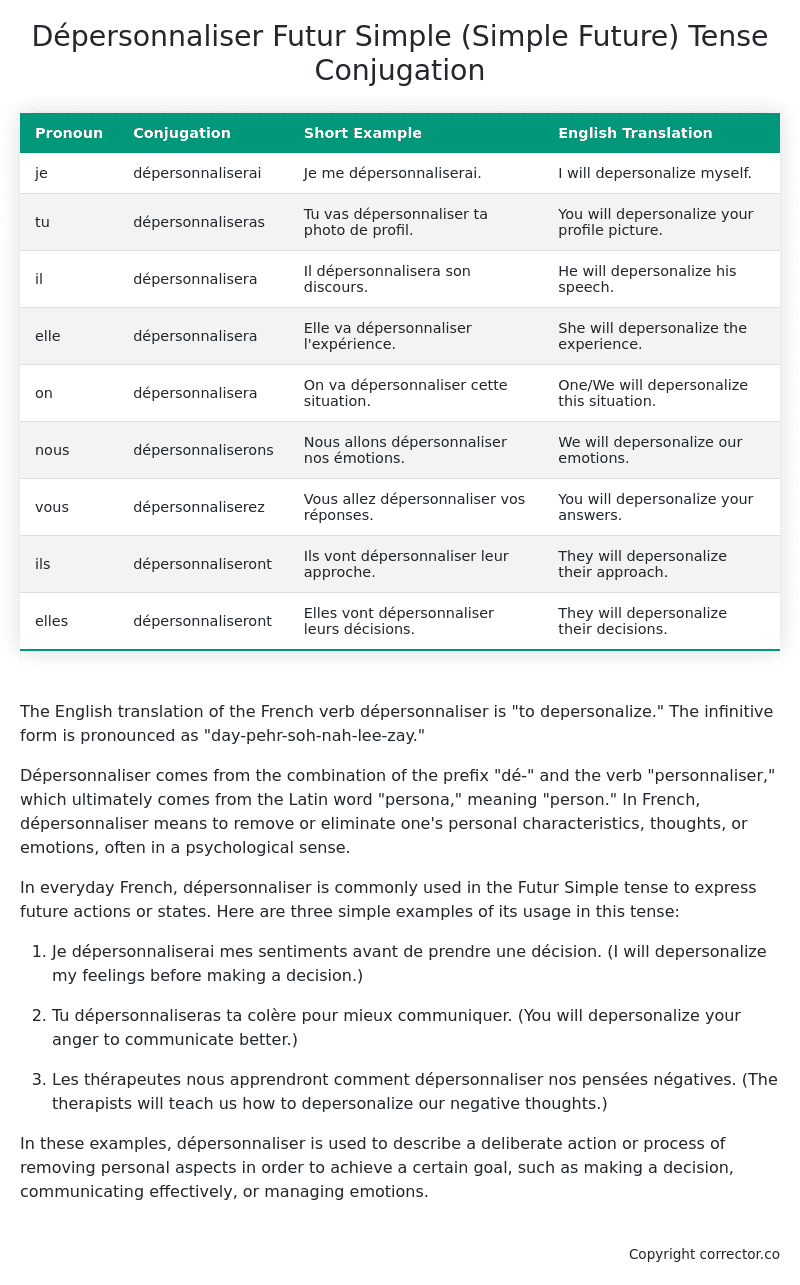Futur Simple (Simple Future) Tense Conjugation of the French Verb dépersonnaliser
Introduction to the verb dépersonnaliser
The English translation of the French verb dépersonnaliser is “to depersonalize.” The infinitive form is pronounced as “day-pehr-soh-nah-lee-zay.”
Dépersonnaliser comes from the combination of the prefix “dé-” and the verb “personnaliser,” which ultimately comes from the Latin word “persona,” meaning “person.” In French, dépersonnaliser means to remove or eliminate one’s personal characteristics, thoughts, or emotions, often in a psychological sense.
In everyday French, dépersonnaliser is commonly used in the Futur Simple tense to express future actions or states. Here are three simple examples of its usage in this tense:
-
Je dépersonnaliserai mes sentiments avant de prendre une décision. (I will depersonalize my feelings before making a decision.)
-
Tu dépersonnaliseras ta colère pour mieux communiquer. (You will depersonalize your anger to communicate better.)
-
Les thérapeutes nous apprendront comment dépersonnaliser nos pensées négatives. (The therapists will teach us how to depersonalize our negative thoughts.)
In these examples, dépersonnaliser is used to describe a deliberate action or process of removing personal aspects in order to achieve a certain goal, such as making a decision, communicating effectively, or managing emotions.
Table of the Futur Simple (Simple Future) Tense Conjugation of dépersonnaliser
| Pronoun | Conjugation | Short Example | English Translation |
|---|---|---|---|
| je | dépersonnaliserai | Je me dépersonnaliserai. | I will depersonalize myself. |
| tu | dépersonnaliseras | Tu vas dépersonnaliser ta photo de profil. | You will depersonalize your profile picture. |
| il | dépersonnalisera | Il dépersonnalisera son discours. | He will depersonalize his speech. |
| elle | dépersonnalisera | Elle va dépersonnaliser l’expérience. | She will depersonalize the experience. |
| on | dépersonnalisera | On va dépersonnaliser cette situation. | One/We will depersonalize this situation. |
| nous | dépersonnaliserons | Nous allons dépersonnaliser nos émotions. | We will depersonalize our emotions. |
| vous | dépersonnaliserez | Vous allez dépersonnaliser vos réponses. | You will depersonalize your answers. |
| ils | dépersonnaliseront | Ils vont dépersonnaliser leur approche. | They will depersonalize their approach. |
| elles | dépersonnaliseront | Elles vont dépersonnaliser leurs décisions. | They will depersonalize their decisions. |
Other Conjugations for Dépersonnaliser.
Le Present (Present Tense) Conjugation of the French Verb dépersonnaliser
Imparfait (Imperfect) Tense Conjugation of the French Verb dépersonnaliser
Passé Simple (Simple Past) Tense Conjugation of the French Verb dépersonnaliser
Passé Composé (Present Perfect) Tense Conjugation of the French Verb dépersonnaliser
Futur Simple (Simple Future) Tense Conjugation of the French Verb dépersonnaliser (this article)
Futur Proche (Near Future) Tense Conjugation of the French Verb dépersonnaliser
Plus-que-parfait (Pluperfect) Tense Conjugation of the French Verb dépersonnaliser
Passé Antérieur (Past Anterior) Tense Conjugation of the French Verb dépersonnaliser
Futur Antérieur (Future Anterior) Tense Conjugation of the French Verb dépersonnaliser
Subjonctif Présent (Subjunctive Present) Tense Conjugation of the French Verb dépersonnaliser
Subjonctif Passé (Subjunctive Past) Tense Conjugation of the French Verb dépersonnaliser
Subjonctif Imparfait (Subjunctive Imperfect) Tense Conjugation of the French Verb dépersonnaliser
Conditionnel Présent (Conditional Present) Tense Conjugation of the French Verb dépersonnaliser
Conditionnel Passé (Conditional Past) Tense Conjugation of the French Verb dépersonnaliser
L’impératif Présent (Imperative Present) Tense Conjugation of the French Verb dépersonnaliser
L’infinitif Présent (Infinitive Present) Tense Conjugation of the French Verb dépersonnaliser
Struggling with French verbs or the language in general? Why not use our free French Grammar Checker – no registration required!
Get a FREE Download Study Sheet of this Conjugation 🔥
Simply right click the image below, click “save image” and get your free reference for the dépersonnaliser Futur Simple tense conjugation!

Dépersonnaliser – About the French Futur Simple (Simple Future) Tense
Formation of Futur Simple
For regular -er verbs (e.g., parler – to speak)
For regular -ir verbs (e.g., finir – to finish)
For regular -re verbs (e.g., vendre – to sell)
Common Everyday Usage Patterns
Conditional Statements
Interactions with Other Tenses
Futur Antérieur
Conditional
Present
Summary
I hope you enjoyed this article on the verb dépersonnaliser. Still in a learning mood? Check out another TOTALLY random French verb conjugation!


